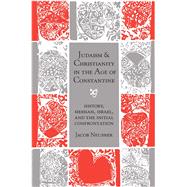
Note: Supplemental materials are not guaranteed with Rental or Used book purchases.
Purchase Benefits
What is included with this book?
| Preface | p. ix |
| Acknowledgments | p. xv |
| Introduction | p. 1 |
| Religion and Political Change | p. 1 |
| Judaism without Christianity | p. 4 |
| The Judaic Sages' Canon in the Context of the Fourth Century | p. 7 |
| Their Intent, Our Interpretation | p. 11 |
| Judaism and Christianity in the Age of Constantine | p. 13 |
| Christianity and the Roman Empire in the Age of Constantine | p. 13 |
| Jews in the Land of Israel in the Fourth Century | p. 18 |
| Judaism in the Land of Israel | p. 23 |
| Genesis Rabbah and Israel's History: Christian and Judaic Theories of History and Its Meaning | p. 29 |
| The Issue of History: Events, Patterns, Proofs | p. 29 |
| Eusebius and the Beginnings of Christian Historiography | p. 31 |
| Genesis Rabbah and Israel's Historical Crisis | p. 36 |
| The Talmud of the Land of Israel and the Messiah: Christian Triumph, Judaic Response | p. 59 |
| The Messianic Crisis | p. 59 |
| Chrysostom: Jewish Unbelief, Christian Wavering | p. 61 |
| The Talmud of the Land of Israel and Israel's Messianic Crisis | p. 65 |
| Leviticus Rabbah, Genesis Rabbah, and the Identification of Israel | p. 81 |
| Who Is Israel? | p. 81 |
| Aphrahat and the People Which Is No Peoples | p. 85 |
| Leviticus Rabbah and Israel's National Crisis | p. 94 |
| Genesis Rabbah: The Claim of the Siblings | p. 106 |
| Genealogy and the Political Crisis | p. 111 |
| Politics and Proof-Texts: Exegesis and Canon | p. 114 |
| A Test of Falsification | p. 114 |
| Same Topic, Different Program: No Encounter | p. 117 |
| Jerome and the Christian Exegetical Tradition | p. 119 |
| Sifre to Numbers and the Judaic Exegetical Tradition | p. 124 |
| The Christian Canon in the Fourth Century: Old and New Testaments | p. 128 |
| The Judaic Canon in the Fourth Century: The Written and Oral Torah | p. 133 |
| The Absence of Confrontation | p. 141 |
| Epilogue: The Shape of the Initial Encounter and the Enduring Confrontation | p. 146 |
| Sages' Success in the Initial Encounter | p. 146 |
| The Enduring Confrontation | p. 149 |
| Appendixes | |
| Genesis Rabbah on Israel's History | p. 153 |
| Aphrahat on Israel | p. 191 |
| Leviticus Rabbah on Israel | p. 203 |
| Genesis Rabbah on Israel | p. 224 |
| Bibliography | p. 231 |
| Index | p. 237 |
| Table of Contents provided by Ingram. All Rights Reserved. |
The New copy of this book will include any supplemental materials advertised. Please check the title of the book to determine if it should include any access cards, study guides, lab manuals, CDs, etc.
The Used, Rental and eBook copies of this book are not guaranteed to include any supplemental materials. Typically, only the book itself is included. This is true even if the title states it includes any access cards, study guides, lab manuals, CDs, etc.